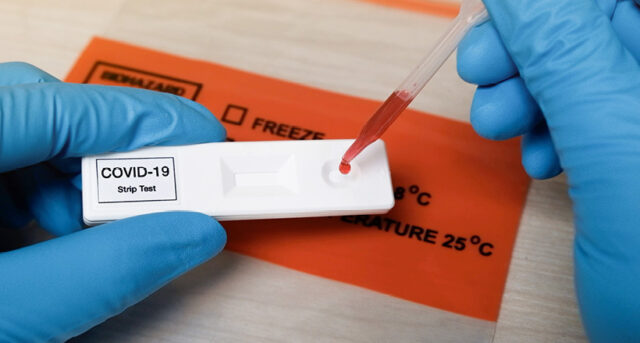Over the past year, up and down the UK, thousands of research and innovation projects have been publicly funded to tackle the pandemic. Researchers and businesses in the East of England are playing a key role in how the UK is combatting COVID-19. Their work forms part of a £550 million COVID-19 rapid investment programme by UK Research and Innovation (UKRI) – the largest public funder of research and development in the UK.
The diversity of UKRI-funded projects is vast – from the world’s first COVID-19 treatments and vaccines, to projects that help us understand and mitigate the impact of the pandemic on our economy, environment, education, arts sector and mental health. This funding builds on decades of public investment and research expertise which have provided the backbone to our national COVID-19 response.
In the East of England, Cambridge-based Decorte Future Industries, are developing adaptive intelligent clothing to help monitor vital signs such as temperature and heart rate of elderly and vulnerable people in care homes. Monitoring vital signs is important if staff are to respond quickly when residents become ill; but it can be time-consuming. With UKRI funding, this company has developed and modified for the pandemic, a low-cost ‘exoskeleton’ that adapts to the wearer’s body to continuously gather, transmit and remotely analyse biometric data around the clock.
Universities across the East of England have also received significant UKRI funding. A project at the University of Essex aims to determine how best to ensure the human rights of residents in care homes are protected, both during the pandemic and in the ‘new normal’ to follow. It is addressing key questions on rights to life, liberty and non-discrimination for residents.
Researchers at the University of Cambridge have received UKRI funding to evaluate a rapid pin-prick blood test for COVID-19 immunity, drawing on state-of-the-art sensor technology. It can readily detect the presence of virus antibodies without the need for time-consuming processing. The device is a disposable, single-use cartridge and could provide an accurate and affordable system for workplaces, transport hubs and healthcare settings.
The University has also received funding for a separate project that looks to examine the impact social distancing may have had on older people’s physical and mental health. Researchers will assess the affect from the shift in their use of online communication, both for informal contact with family members and online health consultations.
Professor Carol Brayne from the University of Cambridge said: “Our funding from UKRI was integral to the development of our project. We’re examining the health, wellbeing, cognition, social networks and care of people aged 75 and over in Cambridgeshire, Nottingham and Newcastle to see the immediate impact and long-term effects that social distancing has had on this age group’s physical and mental health. We hope our research will help government and industry inform ways to best support the elderly moving forward.”
Professor Charlotte Deane, COVID-19-Response Director at UKRI said: “Looking back over the past year, it’s clear that the pandemic has had a devastating impact on so many aspects of our lives, but I take more than a glimmer of hope from the extraordinary work being undertaken by researchers and businesses across the UK. These projects are just the tip of the iceberg. They show the tenacity and creativity of our research and innovation communities in the East of England and beyond, who have stepped up in the most challenging of times to come together and fight back against this devastating disease.”
These projects are among 3,600 new COVID-19 projects, totalling over £554 million, being funded by UKRI across the country in response to Covid-19.




